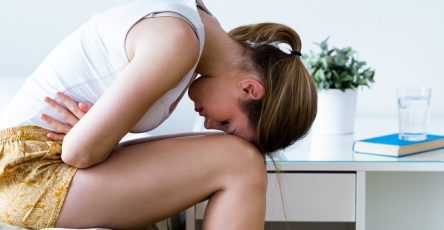adverts
Obstetrician and gynaecologist Dr. John K. Bosomtwe of St. Dominic Hospital in Akwatia has refuted the notion that women’s period pain and discomfort can be alleviated by having sex while they are menstruating. But he clarified that during intercourse, the body releases “pleasure hormones,” which can momentarily lessen the intensity of pain. “The pains you may be feeling at that time can be lessened by these hormones.”
You may momentarily forget about the discomfort and focus on the pleasure your body is experiencing during sex. While some women assert that their pain level lessens at that point and others assert that they don’t feel any pain at all, the majority of the discussions around menstruation are either based on observations or falsehoods. For example, the experiences of Lady “A” and Lady “B” will differ from one another.
He mentioned this in an interview with The Mirror last Tuesday. He claimed that certain males took advantage of some naive young ladies by convincing them that having sex during their periods would alleviate their problems, for reasons that are best known to themselves. The gynaecologist declared that it was time for parents—especially fathers—to put in greater effort to learn about menstruation and to share this knowledge with their daughters and other female family members.
adverts
“This year, my message goes to the fathers; they should get involved in education and know what menstruation is so they are able to explain it to young girls. People have wild fantasies and would say anything to satisfy themselves. However, if the young person has the right knowledge and can freely talk about it, they won’t fall victim to such antics,” he explained.
Sex during menstruation
Dr. Bosomtwe rejected the idea that women may engage in unprotected intercourse during their menstruation and were safe to do so. According to him, women should insist on protection during sexual activity if they are not attempting to conceive because each woman has a unique cycle that could change without them knowing.
“Sex during menstruation can be messy, but if you must have sex during this period, insist on condoms not just as a barrier against pregnancy but also against sexually transmitted diseases. The prevalence rate of HIV keeps increasing, and a lot of people don’t know their status. When you have unprotected sex during your menses, you are highly at risk of contracting sexually transmitted diseases.
“When you have sex during your menses, you predispose yourself to pelvic inflammatory diseases. During that period, the neck of the cervix is open, and any bacteria or organism that has easy access to enter the upper part of the uterus easily implants itself and starts causing a lot of havoc. This, in the long term, can lead to infertility. Some pelvic inflammatory diseases can lead to ectopic pregnancies,” he explained further.
Myths
Menstruation is a natural event for women, but there are still a lot of myths around it, according to Dr. Bosomtwe, which makes it difficult for women to discuss openly. It is still widely held that a woman or girl should never publicly disclose that she is menstruating. It’s seen as a dirty secret and it’s forbidden to voice discomfort. He bemoaned the fact that in some situations, a lady who is menstruating should not contact anyone or even cook since they could contaminate the food.
He was of the view that even before girls start menstruating, there must be a conscious effort by parents or guardians to educate them on the subject and provide the needed support.
World Menstrual Hygiene Day
Every year on May 28, we observe World menstruation Hygiene Day, a day set aside to bring attention to the vital problem of managing menstruation hygiene. The day serves as a reminder of the difficulties that millions of women worldwide encounter as a result of poor hygiene.


